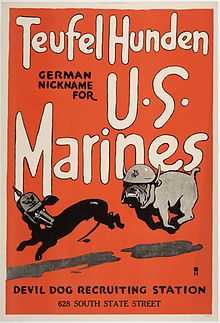Devil Dog

Devil Dog is a motivational nickname for a U.S. Marine. It is said to be based on the apocryphal use of "Teufel Hunden" [sic] by German soldiers to describe Marines fighting in World War I.[1][2]
Origin
According to United States Marine Corps legend, the moniker was used by German soldiers to describe U.S. Marines who fought in the Battle of Belleau Wood in 1918. The Marines fought with such ferocity that they were likened to "Dogs from Hell." The reports were made by American media and not verified by actual Germans. The "Devil Dogs" nickname for Marines first appeared in newspapers in the United States in April 1918 - about two months before the Battle of Belleau Wood. The LaCrosse Tribune ran a story about the nickname on April 27, 1918,[3] and other newspapers used the story as early as April 14, 1918.[4] The Battle of Belleau Wood began on June 1, 1918.[1][5][2]
The April 27th article from the LaCrosse Tribune was probably referring to the action on April 20, 1918, the first action between the Marines and the Germans. The Germans made several attacks against the Marines on that date and were unable to dislodge them. The article states that it was the first scrap between the Marines and the Germans, showing that it was prior to the major fighting in June.
| “ | The term "Devil Dog" has its origins at Belleau Wood. It was in a dispatch from the German front lines to their higher headquarters explaining the current battle conditions that described the fighting abilities of the new, fresh Americans as fighting like "Teufel Hunden" or "Hounds from Hell."[6] | ” |
Grammar problem
In German grammar, a compound noun is always a single word, so using two words "Teufel Hunden" is grammatically incorrect. The correct German would be Teufelshunde in nominative, genitive, and accusative cases, and Teufelshunden only in the dative. In either form, the linking element "s" steps between the words. Examples:
- Sie waren Teufelshunde. - they were devil dogs.
- Er war ein Teufelshund. - he was a devil dog.
- Er sprach von den Teufelshunden. - he talked about the devil dogs.
Furthermore, the word "Teufelshund", though not unknown in the German language, is rare, and this use may possibly be an example of Denglisch. The more common equivalent is "Höllenhund" ("dog of hell" or "hellhound"), the German translation of the mythical Kerberos. All this suggests that the Marines were never actually referred to as "devil dogs" by German WWI soldiers.[1]
Modern use

The term "Devil Dog" is a very common nickname for all Marines. "Devil Dog" is historically a well-accepted term of endearment, as a title of honor. The "dog" in the phrase is usually associated with the bulldog, in line with the original 1918 poster, such as the bulldog being a common mascot in the Corps.
In contrast, the term may assume a negative connotation when its usage is connected to a disciplinary activity. The term "devil dogged" or "devil dogging" has come to mean lectured or otherwise reprimanded, prefaced with being called out as a "devil dog".[7]
Other nicknames for Marines include "First to Fight", "Soldiers of the Sea", "Leatherneck", "Jarhead", "Shock Troop" and Killer (when used affectionately).
Navy Corpsmen assigned to Marine Corps units are sometimes referred to as "Devil Docs".
See also
References
- ↑ 1.0 1.1 1.2 Flippo, Hyde. "German Myth 13: Teufelshunde - Devil Dogs". About.com.
- ↑ 2.0 2.1 Schogol, Jeff (January 4, 2011). "Did Marines, not German soldiers, coin the phrase ‘Devil Dogs’?". Stars and Stripes. Retrieved 27 January 2011.
- ↑ La Crosse Tribune
- ↑ 'Germans call 'em Teufel Hunden: Recruiters Report a New Nickname for Marines', Boston Daily Globe, Apr 14, 1918, p. 13.
- ↑ Simmons, Edwin H.: "Leathernecks at Soissons." Naval History, DEC 2005.
- ↑ Mehringer, MSgt Phil. "Memorial Day, Belleau Wood Style". United States Marine Corps. Retrieved 2007-11-27.
- ↑ Tilghman, Andrew (April 28, 2008). "‘Devil Dog’ term taking a beating". Marine Corps Times.
| |||||||||||||||||||||||||||||||||
